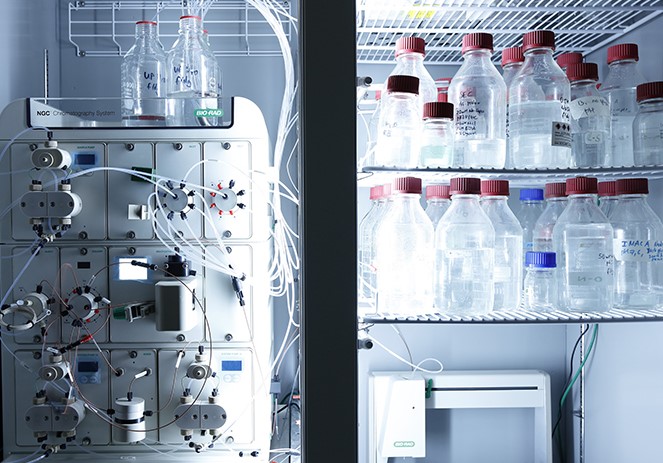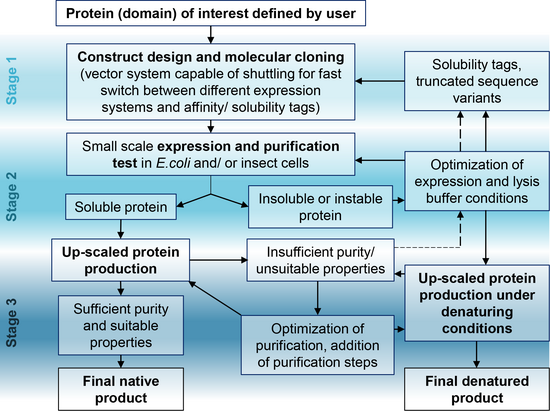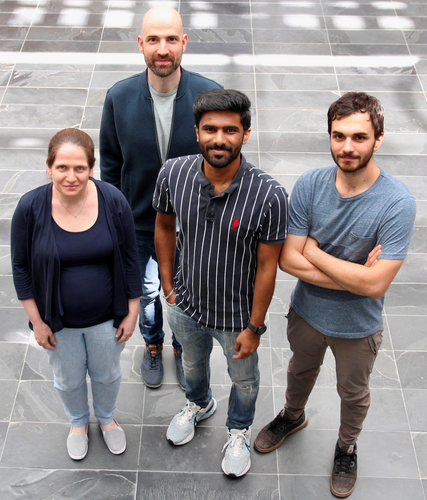Protein Production Core Facility
Overview Head of the Core Facility PublicationsThe Protein Production Core Facility assists during all stages of the production and purification of recombinant proteins.
The Protein Production Core Facility supports you with the design, production, purification and quality control of recombinant proteins, which are widely used in a variety of experimental approaches, including enzymology, interaction studies, antibody generation and structural biology.
We produce most of our proteins in specialized E. coli strains and cultured insect cells, two of the most widely used systems for recombinant protein production. For more challenging or specialized applications, the use of yeast and mammalian expression systems is possible within the institute. We also offer expression vectors with different affinity and solubility tags for bacterial and insect cell expression. For a full list of strains, cell lines and vectors, please refer to our intranet page or contact us.
Our facility also generates and performs quality control for routine laboratory enzymes, growth factors and affinity probes for IMB researchers. We offer ready-to-use enzyme kits for common applications at the institute, significantly reducing costs for IMB groups.
Please note that these services are available for IMB and SFB 1551 members only.

We support you throughout the complete process of protein production. This includes the screening of suitable expression systems and vectors, optimization of purification steps, upscaling of protein production and purification, as well as functional analysis of final purified products. Additionally, we offer complimentary services for recombinant protein analysis and in vitro biochemistry.
Full services:
- Molecular cloning of expression vectors
- Baculovirus production
- Expression system and vector screening (small-scale test expression and pull down analysis)
- Large-scale protein expression in E. coli and Spodoptera frugiperda cultured cells
- Protein purification using state-of-the-art chromatographic methods
- Bio-orthogonal labelling of proteins and antibodies (e.g. with fluorophores or biotin)
- Protein quality control (size exclusion chromatography, SDS-PAGE, UV-Vis spectrum)
- Determination of enzymatic activities and protein-ligand interaction kinetics (Helix+, absorbance and fluorescence measurements on plate readers, gel-based readouts)
Assisted services:
- Training for independent usage of Fast Liquid Protein Chromatography systems, Helix+, proFire, as well as cell culture handling and molecular cloning techniques
- Maintenance and distribution of cell stocks and expression vectors
- Protocol collection for protein purification methods
At the beginning of a new project, we ask that you arrange a user meeting with us to discuss theoretical background, the basic outline of the project and possible strategies. A typical approach for the purification of a specific protein of interest within the facility is summarized in the following flow diagram. We can offer a full service within our pipeline, but also assist you in certain sub-steps of your purification project, if you prefer to take on other tasks yourself.

Key instruments
Our unit is equipped with five fast protein liquid chromatography (FPLC) systems, which can be accessed by trained users. Since August 2022, we also provide training for using the Helix+, which allows chip-based determination of biomolecule interaction kinetics (association- and dissociation constant measurements). We have six incubation shakers, a cell culture area, as well as a Branson Sonifier. A full list of our available equipment can be found in OpenIRIS, our online booking system. For a more detailed description of our instruments, please refer to our intranet page.
Lectures & courses
The Facility gives an annual overview on protein purification systems and methodology during the “Modern Techniques in the Life Sciences” Master module of Mainz University.
Education and training are conducted one-on-one during specific user projects, ensuring optimal case-by-case education.

Contact
If you have any questions about our protein production services, please contact us.
Acknowledgements/Co-authorships
“An acknowledgement of the Core Facilities in your publication is important and more than just a nice way to say thank you. Your acknowledgement matters!”
Acknowledgements are the currency by which Core Facilities are measured: they help us prove our value and our contribution to research results. Acknowledging Core Facilities shows that we are important partners in the scientific community, and it allows us to maintain funding and make further investment in the Core Facilities. In the case that Core Facility staff members have contributed significantly to your research project, we ask that you treat them the same way you would treat any other collaborator and consider a co-authorship.
In accordance with DFG recommendations, we furthermore ask that you acknowledge any instrumentation that is funded through a DFG major instrumentation grant by including the corresponding project number.
Communities
Martin Möckel is a principle investigator and Kanish Siddarth Ravi Chandran is a member of the SFB 1551 “Polymer Concepts in Cellular Function”.

Martin Möckel and Sabine Heinen are members of the “Protein Production and Purification Partnership in Europe” (P4EU).
